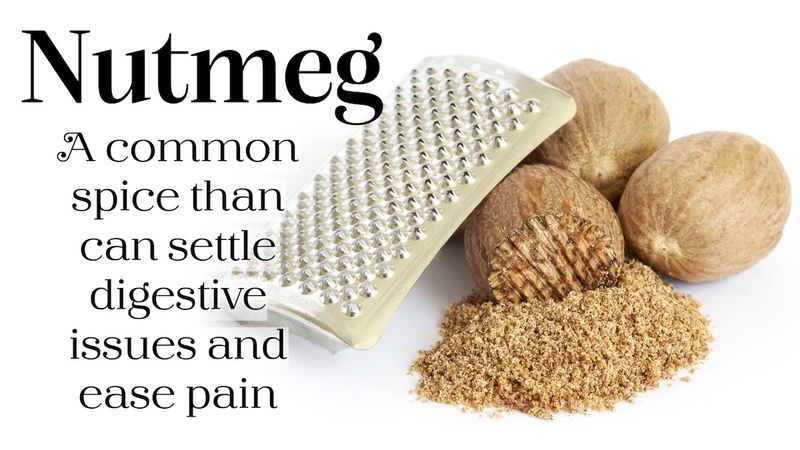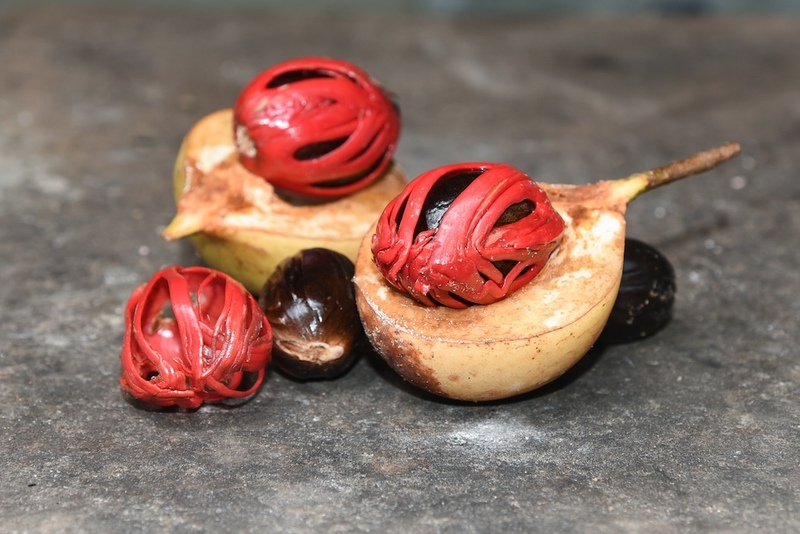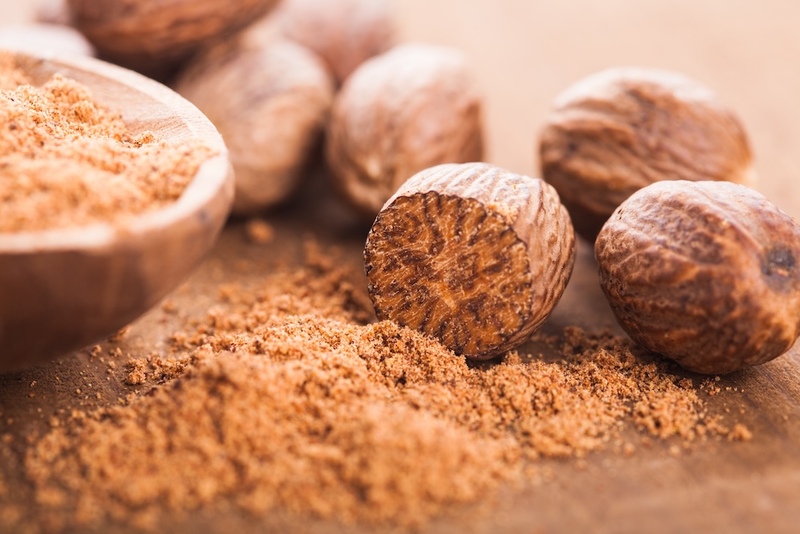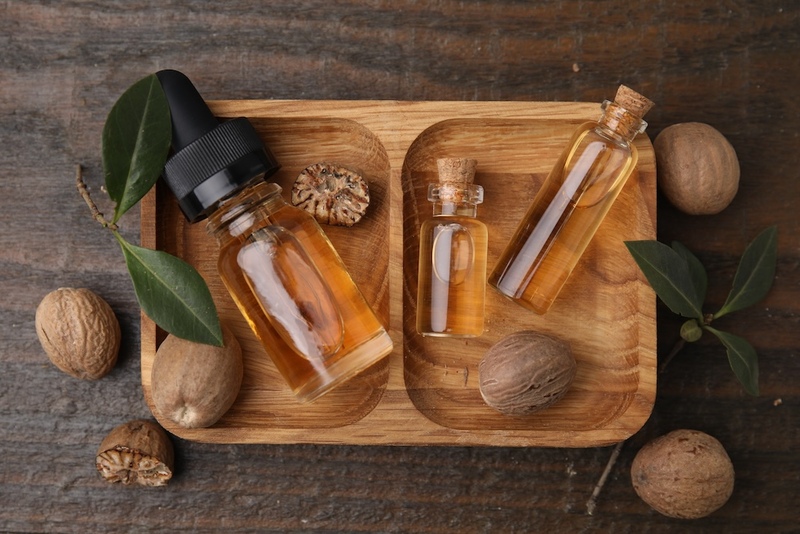
In the late 1980s, I had the opportunity to travel to Malaysia for a one-day training program. While I was there I remember going to an area and seeing all kinds of nutmeg products for sale. There were nutmeg fruits in packages, nutmeg oil, and the nutmeg seeds that we use as a spice in the West. It was clear they were not only eating the fruits, they were using the oil and seeds for various health issues.
In the 1980s I also had the opportunity of going to Tibet. There I saw a heart medicine being prepared. The various herbs had been measured out in piles waiting to be ground and mixed. I don’t remember everything in the blend, but I do remember a pile of nutmegs and another of black pepper. Both of these are pungent herbs and I assumed were being used as circulatory stimulants the way we use ginger, garlic, and capsicum in the West.
Nutmeg: The Spice
 I’ve had a lot more experience using nutmeg as a spice than I have using it as a medicine, but it’s a spice I love. For example, I like to drink warm apple cider during the holidays with a little cinnamon and nutmeg. I also love nutmeg in pumpkin pie and egg nog. I grate a little bit from the whole nutmeg when using the spice rather than using the powder because it has a better flavor.
I’ve had a lot more experience using nutmeg as a spice than I have using it as a medicine, but it’s a spice I love. For example, I like to drink warm apple cider during the holidays with a little cinnamon and nutmeg. I also love nutmeg in pumpkin pie and egg nog. I grate a little bit from the whole nutmeg when using the spice rather than using the powder because it has a better flavor.
There’s another, less commonly used spice derived from the nutmeg tree. It’s called mace. Mace is the outer layer surrounding the nutmeg seed. You can see it in the pictures as the red material under the fruit and on top of the seed. Because mace is more expensive we don’t use it much in the West, but it also has culinary and medicinal properties similar to nutmeg.
Nutmeg and Digestion
 One of the primary uses for nutmeg in Indonesia and China is as a remedy for digestive problems. Nutmeg stimulates appetite and acts as a carminative to reduce gas and bloating. It also eases muscle spasms in the GI tract, which makes it useful for abdominal cramps and pain. It can also help to ease nausea and digestive upset and may even be helpful for ulcerative colitis (although I’d combine it with mucilaginous herbs like marshmallow and slippery elm for intestinal inflammation).
One of the primary uses for nutmeg in Indonesia and China is as a remedy for digestive problems. Nutmeg stimulates appetite and acts as a carminative to reduce gas and bloating. It also eases muscle spasms in the GI tract, which makes it useful for abdominal cramps and pain. It can also help to ease nausea and digestive upset and may even be helpful for ulcerative colitis (although I’d combine it with mucilaginous herbs like marshmallow and slippery elm for intestinal inflammation).
In Chinese medicine, nutmeg is said to enter the large intestine, spleen, and stomach meridians, all of which are associated with the GI tract. It is used to arrest diarrhea and warm up (that is stimulate) the digestive system. A good way to use nutmeg for digestive upset is to grate a little fresh nutmeg into some hot water and steep it to make a tea.
Nutmeg Essential Oil
The oil of nutmeg is typically used topically as an analgesic. It helps draw blood into the afflicted area and eases spasms and pain. It is probably best used in combination with other analgesic oils such as clove, camphor, menthol, wintergreen, and eucalyptus as part of an analgesic blend. It also has an invigorating effect when smelled.
Other Properties of Nutmeg
 Like vanilla and chocolate, nutmeg has effects on the brain and nervous system. These effects are not fully understood, but there may be some effect on both GABA and serotonin receptors in the brain. We do know that nutmeg is considered to an aphrodisiac in Ayurvedic medicine and both chocolate and vanilla also appear to be mildly aphrodisiac, which may be why so many people love them.
Like vanilla and chocolate, nutmeg has effects on the brain and nervous system. These effects are not fully understood, but there may be some effect on both GABA and serotonin receptors in the brain. We do know that nutmeg is considered to an aphrodisiac in Ayurvedic medicine and both chocolate and vanilla also appear to be mildly aphrodisiac, which may be why so many people love them.
You should be aware that in large doses nutmeg has some hallucinogenic properties and is toxic. Small doses are safe though, you'd need to consume around two to three teaspoons before experiencing these adverse effects. Poison control centers across the country have to deal with nutmeg toxicity, primarily from adolescents trying to use the spice to get high. Symptoms of toxicity include digestive upset (nausea and vomiting), high blood pressure, heart arrhythmia, dry mouth, skin flushing, hostility, anxiety, and dizziness. These symptoms suggest that nutmeg upregulates sympathetic nervous system activity, that is, it acts as a nervous system stimulant. But there are more serious symptoms that can occur as well, including psychotic episodes, seizures, and in a few instances, death.
However, none of these effects are going to occur when using nutmeg at the normal amounts called for in recipes or from drinking a little nutmeg tea to settle the stomach. Nor will they occur when nutmeg is used as part of a formula. Also, these effects appear to be limited to nutmeg itself and not to nutmeg oil. The neurological effects appear to be lower or not present in the oil. However, even though this is the case, do not use nutmeg oil internally.
Steven's Articles
-

-
Eucommia Bark
A superior tonic that promotes kidney, structural,…
January
-

-
Goldenthread, Phellodendron, and Yellow Root
Three herbal remedies containing the infection-fighting…
-

-
Teasel
A traditional herb for healing bones and joints…
-

-
Barberry and Healthy Personal Boundaries
A thorny shrub for fighting infections and supporting…
December
-

-
The Evidence for Berberine
A yellow alkaloid found in traditional infection-fighting…
-

-
The Sensible Use of Caffeinated Herbs
Kola nuts, guarana, and yerba mate and other herbs…
-

-
The Health Benefits and Problems with Coffee
This popular caffeinated beverage can be beneficial…
October
-

-
Understanding Caffeine & Cellular Adaptation
Preserving the power of caffeine's buzz and the…
September
-

-
Horseradish
A pungent spice for aiding protein metabolism…
-

-
Banaba or Crepe Myrtle
A beautiful tree from Southeast Asia whose leaves…
August
-

-
Monkeyflowers
Flower essences to help see ourselves more clearly…
-

-
Mariposa Lilies
Strengthening the bond between mother and child…
-

-
The Noble Bay Leaf
A common kitchen herb for aiding digestion and…
-

-
Epimedium: Horny Goat Weed
A circulatory stimulant and kidney yang tonic…
July
-

-
The Medicinal and Nutritional Benefits of Apricots
A nutritious fruit and valuable medicinal seed for coughs

